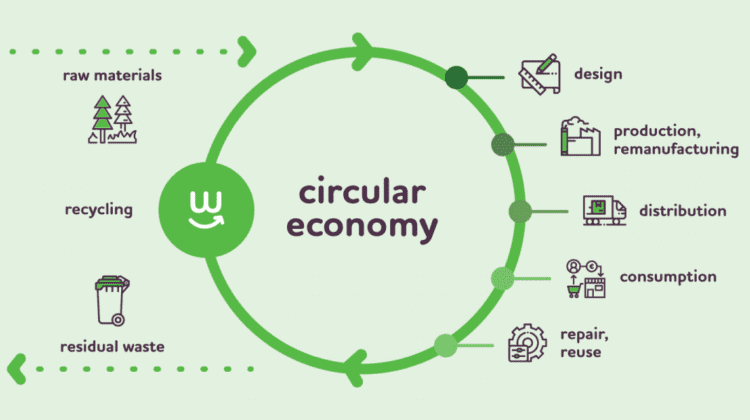

The Circular Economy


Opinion by Mimoze Selimi
A Circular economy is a type of economy that intends to produce zero waste for all kinds of industries and companies, also it aims to produce zero waste in domestic economies as well.
In contrast to the current economy known as the linear economy, whose concept is: produce, use and throw away, a circular economy aims to function according to the concept: produce, use and re-use.
Tweet on Circular Economy as a global trend
The circular economy is slowly becoming a global trend!
According to @UNEP 49 national economies roadmaps and strategies launched the circular economies or are under the finals phase of doing so!#sustainability #GreenEnergy #CircularEconomy pic.twitter.com/pJCL92Jt1I— The_Journalbiz (@the_journalbiz) December 9, 2022
Data from Chatham House on Circular Economy
Circular economy would be the ultimate solution for almost all the environmental problems we are globally facing nowadays. Not only this, the circular economy goes even further by becoming a solution for many other “modern” environmental issues, except global warming.
A proper worldwide model of the circular economy would be enough to:
- solve all the issues with shortage of raw materials,
- put in place a fairer global distribution of goods and services,
- solve the over-production issues,
- reduce overconsumption
- reduce pollution
- solve waste management
Due to a proper circular economy model, more resources would be at our disposal, and with lower costs.
As a result, we would have a more controlled economy, ensure economic stability, with less inflation and global pricing fluctuation due to a deduction of importing and exporting of raw materials.
In 2020, a ‘circular economy action plan’ was published by the European Parliament[1]. This plan requires that countries should come up with methods and ideas to apply circular economy. Nevertheless, the plan itself does not provide an ultimate solution.
Nowadays, it is more important than ever to start using waste as raw material for producing the same or another product.
By doing so, not only can we manage to fulfill the market demand, but we can preserve the natural resources and start recovering from the past damages, already caused on the environment.
The gap between demand for products, services and natural resources is not only due to overpopulation, it has more to do with overconsumption.
As we already know, overconsumption is an urgent matter of discussion, furthermore it is not limited only to food and other beverages, we find overconsumption to be an issue in a lot of directions such as: clothes, houses, cars, traveling, beauty, and so forth.
The overconsumption is an anomaly of the so-called “modern lifestyle”. We could say that the main contributors in this direction are rich countries.
Nevertheless, it is quite challenging to find a modality to reduce overconsumption or solve this trend.Before we can say anything else related to overconsumption, keep in mind that minimalism is not the solution, at least not a fast one.
- Not everybody is ready to leave their luxurious life and embrace a modest one.
Also, taxation alone is not an effective mechanism to control overconsumption. We need some other innovative, and creative methods to achieve effective results in this direction.It is necessary to think more in the direction of waste taxation or examples like that, these kinds of measures would be the best way to tackle waste management.
Since, we consider consumption harder to reduce, then another perspective, would be looking into the possibility of empowering the circular economy, as a necessity for further discussion.
One theory that might work to enforce the application of a circular economy could be rewards for waste management. We can think of some examples as the ones cited below. For all types of waste, if used as a raw material for producing something new, it would ensure its collector a reward, the reward could be related to the following:
- Monetary Reward for those who collect and deliver waste for reproduction purposes
- Replacement of the same product with the new one, for a very low amount of payment
- Fiscal and operational facilities incentives for the companies who choose to collect and put to work used products and materials.
On the contrary, the ones who do not manage their waste, and choose to buy the product themselves, would pay a much higher price.
Needless to say, the application of a circular economy model is quite challenging. Furthermore, there should be a different approach for each industry. Because it is not possible to use the same technology and methods to reuse electronic waste and plastic waste. However, given the circumstances, this would the most desired outcome, out of many elaborated in our research
Conclusion: it is fair to say that no matter what types of incentives are going to be applied, we are still going to see that a circular economy will be applied to all countries sooner or later.








